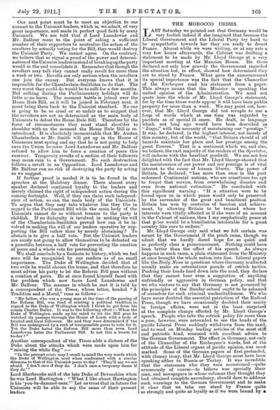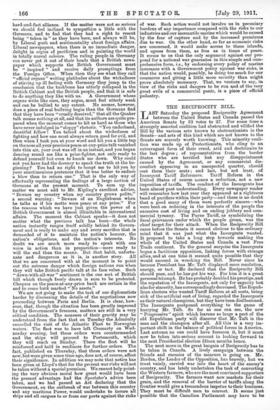THE MOROCCO CRISIS.
TAST Saturday we pointed out that Germany would be very foolish indeed if she imagined that because the Liberal Government and the Liberal Party try hard to be sympathetic towards her they are ready to desert France. Almost while we were writing, or at any rate a very few hours afterwards, the Cabinet was drafting a statement to be made by Mr. Lloyd George at a very important meeting at the Mansion House. He there declared not only how gravely the Government regarded the situation but, in effect, showed how determined they are to stand by France. What gave the announcement its special importance was the fact that the Chancellor of the Exchequer read his statement from a paper. This always means that the Minister is speaking the united opinion of the Administration. We need not quote here the whole of Mr. Lloyd George's statement, for by the time these words appear it will have been public property for more than a week. We may point out, how- ever, that Mr. -Lloyd George did not scruple to use a forpi of words which at one time was regarded by pacifists as of special ill omen. He dealt, in language which not long ago would have been described as "Jingo," with the necessity of maintaining our "prestige."
It was, he declared, in the highest interest, not merely of this country, but of the world, " that Britain should at all hazards maintain her place and her prestige among the great Powers." That is a sentiment which we, and also, we believe, the vast majority of the readers of the Spectator, will endorse with the heartiest goodwill. We are not less delighted with the fact that Mr. Lloyd George showed that the maintenance of our power and our prestige is of vital interest to the cause of human liberty. The power of Britain, he declared, "has more than once in the past redeemed Continental nations, who are sometimes too apt to forget that service, from overwhelming disaster and even from national extinction." He concluded with this significant warning : " If a situation were to be forced upon us in which peace would only be preserved by the surrender of the great and beneficent position Britain has won by centuries of heroism and achieve- ment, by allowing Britain to be treated where her interests were vitally affected as if she were of no account in the Cabinet of nations, then I say emphatically peace at that price would be a humiliation intolerable for a great country like ours to endure."
Mr. Lloyd George only said what we felt certain was meant by the Government if the pinch came, though we admit that we hardly dared hope for so quick and so perfectly clear a pronouncement. Nothing could have been better than the effect of his speech. As always happens in such cases, a plain statement from the Ministry at once brought the whole nation into line. Liberal papers like the Daily News in questions where Germany is affected usually make an ostentatious parade of ostrich tactics. Pushing their heads hard down into the sand, they declare that they cannot hear even a suggestion of anything unfriendly or aggressive in German policy, and that we who venture to say that Germany is not governed by the principles of the Sunday-school ought to be ashamed of ourselves for such criminal uncharitableness. We who have never doubted the essential patriotism of the Radical Press, though we have occasionally doubted their sanity in foreign affairs, were not in the least surprised at the complete change effected by Mr. Lloyd George's speech. People who take the ostrich policy for more than a pose, however, were astounded to see the heads of the pacific Liberal Press suddenly withdrawn from the sand, and to read on Monday leading articles of the most stiff and patriotic kind, seasoned with excellent advice to the German Government. The effect in Germany, not only of the Chancellor of the Exchequer's words, but of the attitude of the Liberal organs of pacific opinion, was most marked. Some of the German papers at first pretended, with clumsy irony, that Mr. Lloyd George must have been speaking either to Russia or Turkey. It was incredible that the statesman who they were accustomed—quite erroneously of course—to believe was specially their man, and newspapers in whose columns they thought they had obtained complete ascendancy, should dare to address such warnings to the German Government and to make it clear that we take our stand by France quite as strongly and quite as loyally as if we were bound by a hard-and-fast alliance. If the matter were not so serious we should feel inclined to sympathize a little with the Germans, and to feel that they had a right to resent " taken in " as they have been, and always will be, by 'beral gush and sentimentality about foreign affairs. Liberal newspapers, when there is no immediate danger, delight in orgies of pacificism and in painting the world in totally unreal colours. The ruling people in Germany can never get it out of their heads that a British news- paper which supports the British Government must be " inspired " and receive daily promptings from the Foreign Office. When then they see what they call " official organs " writing platitudes about the wickedness of stirring up ill feeling with Germany they jump to the conclusion that the backbone has utterly collapsed in the British Cabinet and the British people, and that it is safe to do anything they like with us. A Government whose organs write like ours, they argue, must feel utterly weak and can be bullied to any extent. No sooner, however, does a piece of real bullying begin than the Germans find that they have been " cruelly deceived," that all the Quaker talk means nothing at all, and that its authors are quite pre- pared when the moment comes to hit as hard as those who have never indulged in " sloppy" rhetoric. "You underhand, deceitful fellow ! You talked about the wickedness of fighting and how one must always return good for evil, and then when I took you at your word and hit you a little tap on the nose all your precious peace-at-any-price talk vanished into thin air, your coat was off in an instant, and you began dancing round me like a prize-fighter, not only ready to defend yourself but even to knock me down. Why could not you have had the decency to speak the truth at the be- ginning ? You bad no right to tempt me to hit you by your sanctimonious pretences that it was better to endure a blow than to return one." That is the only way of effectually representing the feelings of a large section of Germans at the present moment. To sum up the matter we must add to Mr. Kipling's excellent advice, " Beware my country when my country grows polite," a second warning : " Beware of an Englishman when he talks as if his motto were peace at any price." For the reasons which we have just given the power of a British Government is almost illimitable in international affairs. The moment the Cabinet speaks—it does not matter what the previous talk has been—the whole nation instantly ranges itself solidly behind its Govern- ment and is ready to make any and every sacrifice that is demanded of it to maintain the nation's honour, the nation's obligations, and the nation's interests. No doubt we are much more ready to speak with one voice in action than in preparation—more ready to will the end than the means. But that habit, unfortu- nate and dangerous as it is, is another story. All that we are concerned with at the moment is to point out the extreme danger which foreign nations run when they will take British pacific talk at its face value. Such " down-with-all-war " sentiment is the one sort of British bill which though freely drawn is sure to be protested. Cheques on the peace-at-any-price bank are certain in the end to come back marked " No assets."
We are not going to make the task of our diplomatists harder by discussing the details of the negotiations now proceeding between Paris and Berlin. It is clear, how- ever, that, though the situation has been greatly improved by the Government's firmness, matters are still in a very critical condition. The measure of their gravity may be understood from the fact that on Tuesday the Admiralty cancelled the visit of the Atlantic Fleet to Norwegian waters. The fleet was to have left Cromarty on Wed- nesday evening, but these orders were countermanded and the ships will proceed to Portsmouth, which they will reach on Sunday. There the fleet will he reinforced and held in readiness for further orders. The fact, published on Thursday, that these orders were not new, but were given some time ago, does not, of course, affect their significance. In addition we may note that notice has been given at Lloyd's that for the present war risks will not be taken without a special premium. We cannot help point- ing the very obvious moral how great would have been the present advantage had the Spectator's advice been taken, and we had passed an Act declaring that the Government, on the outbreak of war between this country and any maritime Power, would undertake to insure all ships and all cargoes to or from our ports against the risks of war. Such action would not involve us in pecuniary burdens of any importance compared with the risks to our industries and our mercantile marine which would be caused by the fear of capture and by the increased premiums due to war. On the other hand, so far as economic risks are concerned, it would make access to these islands, and egress from them, as free as in times of peace. It seems to us that the only argument against our pro- posal for a national war guarantee in this simple and com- prehensive form, i.e., by endorsing every policy of marine insurance with a, Government policy against war risks, is that the nation would, possibly, be doing too much for our commerce and giving a little more security than might prove absolutely necessary. That, we venture to say, in view of the risks and dangers to be run and of the very great evils of a, commercial panic, is a piece of official pedantry.







































 Previous page
Previous page